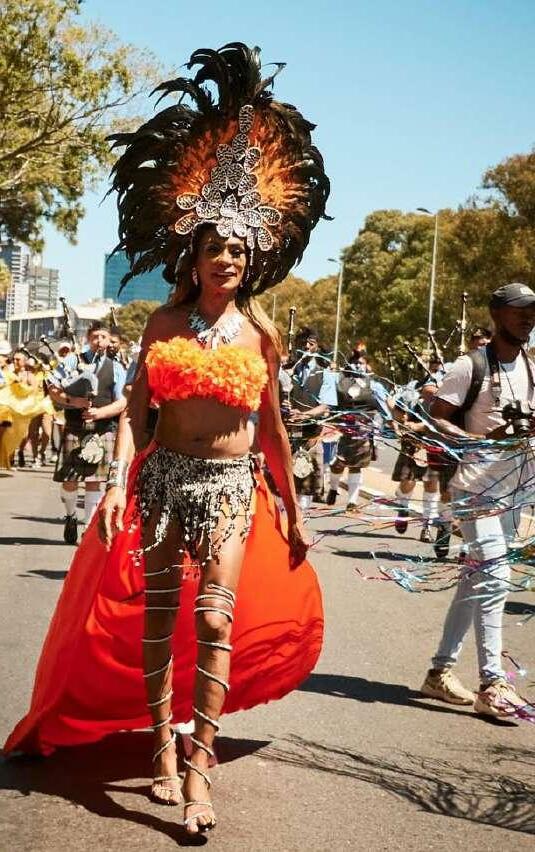
2 minute read
5 REASONS WHY PRIDES MATTER
AS WE PREPARE TO CELEBRATE PRIDE 2023, WE LOOK AT WHY PRIDE EVENTS ARE STILL IMPORTANT FOR LESBIAN, GAY, BISEXUAL, TRANSGENDER AND INTERSEX (LGBTI) PEOPLE AND ACTIVISTS ACROSS THE WORLD.
1. People are still attacked because of their real or perceived sexual orientation and gender identity
Advertisement
Threats, violence, and harassment against LGBTI people happen every day, including during Prides. In a number of countries, events cannot go ahead without a heavy police presence. I many countries
Pride marchers are attacked and harassed, they bear the brunt of hate speech and have religious zealots shouting how their future is a life of eternity in hell. These insults and attacks amount to hate speech, but they demonstrate that the freedoms we, as a community, enjoy, are not recognised by everyone.
Homophobic and transphobic hate crimes have a devastating impact on LGBTI communities. The fear of being targeted pushes people to hide their identity. When attackers go unpunished it spreads distrust towards the police and the courts. What’s more, many of these hate crimes are under-reported, which means people don’t get the protection they urgently need.
2. Prides are an opportunity to challenge homophobic and transphobic legislation
LGBTI rights activists have been prevented from holding Pride events in a number of countries. In Moscow, Russia, for example, since 2006. In Ghana, Uganda, and other African nations, anti LGBT+ legislation is being tabled to remove the few rights LGBT+ people have in these countries
Prides are an opportunity to highlight these legislative issues and pressure the authorities to act on behalf of the community.
3. Rights can never be taken for granted
Even in countries where in the past Pride events were allowed to go ahead, we cannot take things for granted. Legislation can and in many countries does get repealed. Whilst LGBT+ rights are written into the South African constitution; the constitution can be changed if those tabling the motion get the necessary majority required by the law to do so.
4. Prides contribute to changing hearts and minds
Change is possible, even when homophobic and transphobic attitudes exist. When 70 LGBTI activists marched in the streets of Riga, Latvia, for the very first Pride event in 2005, they were met by over 2,000 counter-protestors, and many of them were attacked. Ten years on, more than 5,000 people took part in EuroPride 2015, with only 40 counter-protestors and no serious incidents reported. “The marchers as well as the people watch- ing us were happy, many of them were waving hands,” said Rupert, an activist from the German Queer Amnesty group, who also took part in one of the first Prides in Riga.
Similarly, after being banned three years in a row, Belgrade Pride in Serbia took place successfully in 2014 and 2015. In both instances the event went ahead peacefully and according to the organizers’ plan, with proper protection from the police. This sends a strong message to the local population as well as other cities and neighbouring countries. It demonstrates a commitment from authorities to uphold LGBTI rights and shows that activism can bring change.
And here in Cape Town the first Pride celbrations were relatively small street parties in de Waterkant and today, Pride is attended by thousands of people and is one of the main events on the City of Cape Town’s events calendar.

5. Prides are empowering
Pride events are about human rights; they empower LGBTI individuals to reclaim the rights and freedoms they are denied, and the public space they are often excluded from. Visibility is crucial, especially when the State and opposition groups go to considerable lengths to put LGBTI people at the margins of society.
The first ever Pride in South Africa in Hillbrow, Johannesburg, marchers wore brown paper bags over their heads to avoid being recognised – today we march openly and proudly.
Fighting shame and social stigma, and marching in the face of threats and violence – Pride parades are not only inspiring celebrations of difference but also a declaration of intent. Through these events, demonstrators assert that they will not to be intimidated, that they will continue to demand equality, and that LGBTI rights are human rights.








